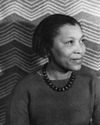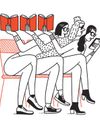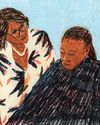
She is participating in a paid experiment in “adversarial tech,” undergoing a procedure that will ever so slightly alter her features, making her harder for surveillance cameras to identify. As the book opens, May is mid-op, the needle advancing its “slender and relentless line of penetration” across her temple, toward the skin of her eyelid. What lies on the other side of the surgery? “Some sort of transformation, undeniable but undetectable,” Phillips writes. “Faint shifts in shading . . . her features wavering a bit between familiarity and unfamiliarity, the way she might look in a picture taken from a strange angle.”
The novel takes place in a dystopian world that is at once recognizable and subtly different from our own. Climate change has devastated the environment. (“If only the forests hadn’t burned,” May thinks. “If only it wasn’t so hard, so expensive, getting out of the city, getting beyond the many rings of industry and blight.”) Cameras and screens are as omnipresent as the pollution in the air; privacy, access to nature, and freedom from advertising have become luxury goods. Many jobs have been automated, including May’s. Previously employed by a company that developed “the communicative abilities of artificial intelligence,” May was laid off after unwittingly training an A.I. network that made her obsolete. Her husband, Jem, a former photographer, is keeping them afloat as a gig worker, emptying mousetraps and cleaning out closets. The couple’s anxiety about the future has filtered down to their children, the eight-year-old Lu and six-year-old Sy, who are shown doting on a cockroach, obsessing over disaster-preparedness manuals, and rejoicing at flavorless strawberries. The kids fill their insomniac parents with love and fear. “What will this planet hold for them by the time they’re our age?” May and Jem ask, clutching each other in bed.
Denne historien er fra August 26, 2024-utgaven av The New Yorker.
Start din 7-dagers gratis prøveperiode på Magzter GOLD for å få tilgang til tusenvis av utvalgte premiumhistorier og 9000+ magasiner og aviser.
Allerede abonnent ? Logg på
Denne historien er fra August 26, 2024-utgaven av The New Yorker.
Start din 7-dagers gratis prøveperiode på Magzter GOLD for å få tilgang til tusenvis av utvalgte premiumhistorier og 9000+ magasiner og aviser.
Allerede abonnent? Logg på

MING HAN ONG
Thadeus had never offered to take Johnny Mac out for a meal before. This is new, Johnny Mac says, grinning. For twenty-five years, Johnny Mac worked as a tenant-rights lawyer. He is a fount of varied and surprising knowledge.

ZORA NEALE HURSTON'S CHOSEN PEOPLE
What a long-unpublished novel reveals about her magnificent obsession.

FEAR AND LOATHING
Are all our arguments really over who's harmed?

ODD JOBS
\"Severance,\" on Apple TV+.

ON A MISSION FROM GOD
Inside the movement to redirect billions of taxpayer dollars to private religious schools.

MAKE HIM LAUGH
How Lorne Michaels's sensibility governs \"Saturday Night Live.\"

TABULA RASA
“Bleb” is worth eight points in Scrabble. Thought you might like to know. I have known the word since Wednesday, June 11, 1958, when I learned it from a company physician at Time Incorporated, in Rockefeller Center. He said I should have been hospitalized four days ago, but there was nothing much to do about it now, go back to work.

WELCOME TO OUR FIRST/FINAL BOOK CLUB!
Thank you, everyone, for coming to our first/final book-club meeting. Apologies for how long it's taken us to settle on a date, but in between work, kids, and the pretense of joining adult recreational sports leagues, it seems that we all have incredibly busy schedules.

THE POISON MACHINE
The talk-show host Yinon Magal's hard-line tactics.

MEAN TIME
“Hard Truths.”